高三英语一轮复习学案:语法部分第5讲动词时态和语态
高三动词时态语态基础复习学案

高三一轮语法复习-动词时态、语态一、高考时态、语态必备基础知识1、时态是一种动词形式,它是“时”和“体”的组合。
“时”有现在、过去和将来之分,“体”有一般、进行、完成之别。
2、英语中的动词一般都有主动和被动两种语态。
被动语态由be+过去分词(P.P)构成,be随着主语的人称、数、时态和语气的不同而变化。
二、命题规律对时态、语态的命题侧重于考查其在特定语境中的基本用法。
三、方法突破和解题思路1、切不可脱离语境2、掌握时态的基本用法和语法规则,但不能死记硬背。
3、遵循如下解题思路该动作发生在何时(定时)→处于什么状态(完成、未完成、进行)→动词与主语关系(主动、被动)四、高考常考时态的基本用法A: 现在时态1. He (be) a student and he (study)several subjects.2. We (have) P.E. class twice a week.3. Iron (feel) hard, but cotton (feel) soft.4. The earth (travel) around the sun.5. Flight 3038 to Xia Men (fly) off at three O’clock in the a fternoon. Conclusion:1. – Is this your raincoat:?-- No, mine (hang) there behind the door.2. My brother (study) in the U.S.A. at present.3. I have won a holiday for two days to Florida. I (take) my mother.Conclusion:1. I (see) the film, so it is unnecessary for me to see it again.2. You the most beautiful that I (meet) in this world.3. This is the first time I (be) here.4. Don’t jump off until the bus (stop) completely.Conclusion:1. We (study) English for 9 years, but it will be a long way for us to go before we really mastered it.2. It (rain) for three days; no wonder the road is so muddy.Conclusion:Exercises:1. This machi ne ____. It hasn’t worked for years.A. didn’t workB. wasn’t workingC. doesn’t workD. isn’t working2. The number of deaths from heart disease will be reduced greatly if people ____ to eat more fruitand vegetables.A. PersuadeB. will persuadeC. be persuadedD. are persuaded3. Listen to the two girls by the window. What language ____?A. did they speakB. were they speakingC. are they speakingD. have they been speaking4. Ladies and gentleman, please fasten your seat belts. The plane ____.A. takes offB. is taking offC. has taken offD. took off5. My brother is an actor. He ____ in several films so far.A. appearsB. appearedC. has appearedD. is appearing6. —I’m sure Andrew will win the first prize in the final.— I think so. He ________ for it for months.A. is preparingB. was preparingC. had been preparingD. has been preparingB. 过去时态1. When I was a boy, I often (play)in that park.2. I was about to jump into the river when suddenly I (see) an old man shout to me, ―Don’t do that.‖Conclusion:1. I (do) homework this time yesterday.2. –Has Mary finished writing her novel?-- I am not sure, but she last month.3. My brother (fall) while he (ride) the bicycle.Conclusion:1. When I got to the cinema, the film (start).2. By then he (learn) English for three years.3. It was the third time that we (make) the same mistake.4. I (mean) to help you, but I was too busy at the moment.Conclusion:Exercises:1.The president hopes that the people will be better off when he quits than when he .A. has startedB. startsC. startedD. will start2. --- Jack and David are brothers. --- Oh, I ____ why they looked so alike.A. was wonderingB. wonderC. have wonderedD. will wonder3. --- What were you doing when Tony phoned you?--- I had just finished my work and ____ to take a shower.A. had startedB. startedC. have startedD. was starting4. --- Has Sam finished his homework today?--- I have no idea. He ____ it this morning.A. didB. has doneC. was doingD. had done5. --- Have you seen Michael recently?--- Yes, in fact I saw him this morning. I ____ him for two years.A. haven’t seenB. hadn’t seenC. didn’t seeD. don’t see6. Susan decided not to work on the program at home because she didn’t want her parents to know what she ____.A. has doneB. had doneC. was doingD. is doingC. 将来时态1. –Have you washed your clothes?– Sorry, I have forgotten. I (go) right now.2. The students (have) five English classes per week this term.3. Look at the clouds. It (rain).Conclusion:1. What (you do) this time tomorrow?2. I (see) Mr. Jackson tomorrow.Conclusion:1.I (finished) it by next Friday.2.By next Monday, she (study) here for three years.3. By the time the sun sets, they (work) on the farm for six hours. Conclusion:1.He said that he (wait) for us at the bus stop.2.Wherever we had troubles, he (come) to help us.Conclusion:Exercise:1. ---Did you tell Julia about the result? --- Oh, no, I forgot. I ____ her now.A. will be callingB. will callC. callD. am to call2. The mayor says that all construction work for the Brazil Olympics ____ by 2016.A. has been completedB. has completedC. will have been completedD. will have completed3. By the time Jane gets home, her aunt ____ for London to attend a meeting.A. will leaveB. leavesC. will have leftD. left4.Ken was so busy when we saw him, because he _______ a speech the next day.A. will makeB. would makeC. has madeD. was making。
(完整版)高三英语复习教案:动词时态和语态
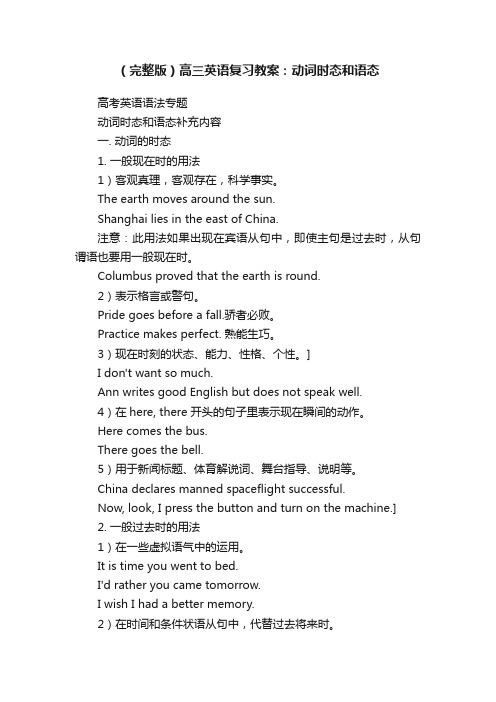
(完整版)高三英语复习教案:动词时态和语态高考英语语法专题动词时态和语态补充内容一. 动词的时态1. 一般现在时的用法1)客观真理,客观存在,科学事实。
The earth moves around the sun.Shanghai lies in the east of China.注意:此用法如果出现在宾语从句中,即使主句是过去时,从句谓语也要用一般现在时。
Columbus proved that the earth is round.2)表示格言或警句。
Pride goes before a fall.骄者必败。
Practice makes perfect. 熟能生巧。
3)现在时刻的状态、能力、性格、个性。
]I don't want so much.Ann writes good English but does not speak well.4)在here, there 开头的句子里表示现在瞬间的动作。
Here comes the bus.There goes the bell.5)用于新闻标题、体育解说词、舞台指导、说明等。
China declares manned spaceflight successful.Now, look, I press the button and turn on the machine.]2. 一般过去时的用法1)在一些虚拟语气中的运用。
It is time you went to bed.I'd rather you came tomorrow.I wish I had a better memory.2)在时间和条件状语从句中,代替过去将来时。
Mother said I couldn’t watch TV before my homework was finished.3)情态动词could, would表示委婉语气。
Could you lend me your bike?Would you help me?4) used to do/ wouldused to do “过去常常”,表示过去习惯性的动作或状态。
动词时态语态教学设计-高三英语一轮复习

基于动词时态语态的教学设计教学目标知道动词时态和语态结构在具体语境中,能解释动词时态和语态的用法在具体语境中,正确运用动词的时态和语态使句子完整教学活动教学活动1 画出被动语态的思维导图(知道)被动语态的构成:一般现在时:am/is/are+p.p一般过去时:was/were+p.p一般将来时:will/shall+be+p.p或者am/is/are going to be+p.p 过去将来时:would/should be+p.p或was/were going to+p.p 现在进行时:am/is/are being+p.p过去进行时:was/were being+p.p现在完成时:have/has been+p.p过去完成时:had been+p.p将来完成时:will have been+p.p情态动词+be+p.p不能用被动语态的情况:谓语动词是不及物动词,因为没有宾语谓语动词是静态动词,如:have,lack等宾语是反身动词或相互代词的句子主动表被动的若干情形:谓语动词为系动词谓语动词表示事物的特性而不涉及具体动作sb/sth be+adj+to do 主动表被动have sth to dobe worth doingneed,want,require+doing/to be donebe to blame疑问代词+to do教学活动2 解释下列句子中的动词时态和语态的用法(理解)1.In the last five years,Zhao__has walked__ (walk) through 34 countries in six continents,and in 2016, he reached the top of Kilimanjaro,Africa's highest mountain.解释:根据空前的时间状语In the last five years可知,句子应该用现在完成时,主语zhao表示单数意义,故填has walked.2. The leader of the China CulturePromotion Society_____adressed___________(adress) the opening ceremony.解释:考察时态,分析句子成分可知,空出在句子中作谓语。
高三英语语法复习教案-动词时态语态

高三英语语法复习教案-动词时态语态【时态的基本概念】时态是表示谓语动作时间概念的动词形式。
英语中的时态专指谓语动词而言,不同时间概念的谓语动作有不同的时态,每一个时态又有各自不同的动词形式。
高中阶段要求学生熟练掌握八种时态,此外现在完成进行时在高中教材中反复出现,也应列入"应知应会"的范围。
1.一般现在时:经常发生的动作或规律性的动作。
Each person needs water and a diet of healthy food. (P.2, Senior Book1B)The moon travels round the earth once every month. (P. 8, Senior Book2B)在时间状语从句和条件状语从句中,用一般现在时表示将来的概念。
引起时间状语从句的连词有:when, after, before, until, as soon as;引起条件状语从句的连词有:if, unless; so(as)long as。
I will not stop my fight against slavery until all slaves are free. (P.52, Senior Book1A)2.一般过去时:过去发生过了的动作,这个动作的全过程已经结束。
诸如yesterday, last……ago都是典型的一般过去时的时间状语。
Fortunately, I was in time for the interview. (P.34, Senior Book2B)The interview went well and I told the company about my experiences and answered their questions as honestly as I could. (P.34, Senior Book2B)3.一般将来时:将要发生的动作。
动词的时态和语态-2025年高考英语一轮复习参考答案

动词的时态和语态时态:时态主动被动一般现在时do/does; am/is/are am/is/are done一般过去时did; was/were was/were done 一般将来时will/shall do will/shall be done过去将来时would/should dowas/were going to dowas/were(about)to dowould/should be donewas/were going to be donewas/were(about)to be done现在进行时am/is/are doing am/is/are being done过去进行时was/were doing was/were be ing done将来进行时will/shall be doing现在完成时have/has done have/has been done过去完成时had done had been done将来完成时will have done will have been done2.必备知识考点一一般时知识点1一般现在时1.表示经常性的动作,常与usually,always,often,sometimes,never,every day等表示频度的时间状语连用。
2.表示客观真理、格言或者警句等。
3.表示按规定、时间表、计划或安排要发生的动作。
动词come, go, arrive, leave, start, begin, return, live, fly等,常用一般现在时表示将来发生的动作。
4.在时间、条件等状语从句中常用一般现在时代替一般将来时。
5.以here/there开头引导的倒装句,表示正在发生的动作/状态6.用于文章标题、图片说明、电影说明、戏剧内容及场景解说等。
知识点2一般过去时1. 表示在过去发生的一次性动作或习惯性动作或存在的状态,常用yesterday,last year,in 1995,the other day等作时间状语。
高三英语一轮复习 语法专练五动词的时态和语态
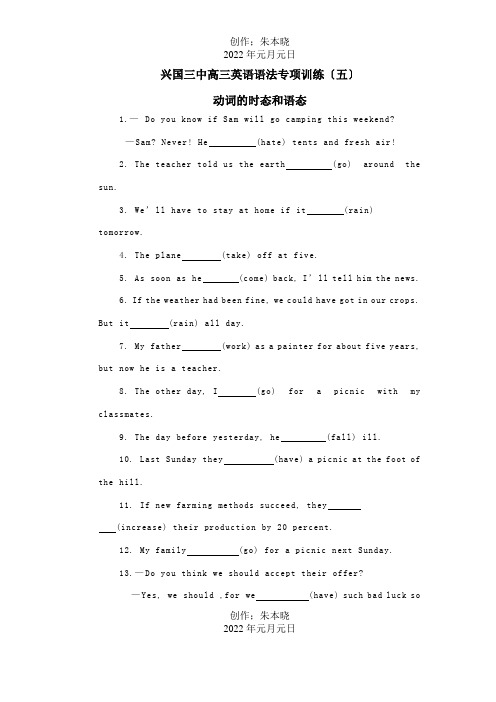
兴国三中高三英语语法专项训练〔五〕动词的时态和语态1.— Do you know if Sam will go camping this weekend?—Sam? Never! He (hate) tents and fresh air!2. The teacher told us the earth (go) around the sun.3. We’ll have to stay at home if it (rain) tomorrow.4. The plane (take) off at five.5. As soon as he (come) back, I’ll tell him the news.6. If the weather had been fine, we could have got in our crops. But it (rain) all day.7. My father (work) as a painter for about five years, but now he is a teacher.8. The other day, I (go) for a picnic with my classmates.9. The day before yesterday, he (fall) ill.10. Last Sunday they (have) a picnic at the foot of the hill.11. If new farming methods succeed, they(increase) their production by 20 percent.12. My family (go) for a picnic next Sunday.13.—Do you think we should accept their offer?—Yes, we should ,for we(have) such bad luck so创作;朱本晓2022年元月元日far, and time (run) out.14. Unless it (rain), we’ll go for a picnic next Sunday.15. Ladies and gentlemen, please fasten your seat belts. The plane (go) through a cloud.16. We were about to leave school it began to snow.17. If you (win) the game, you will have to train hard.18. I’ll take my umbrella in case it (rain).19. Listen! The girl (play) the piano in the next room.20. Look! They (swim) in the lake.21. When I got home, Mum (cook) lunch in the kitchen.22.—I saw Ann at the concert yesterday.—Impossible. She (play) chess with me in my room then.23.—Why did you go to watch the diving competition yesterday?—My brother (play).24. At two o’clock yesterday afternoon, my father(work) in the vegetable garden.25. When they got to the destination, the sun(shine) brightly.创作;朱本晓2022年元月元日26. He said he (return) to his hometown the next month.27.—Lucy, you didn’t come to the ball last night?—I , but I had an unexpected visitor.28. He said they (return) to their motherland in the near future.29. Tom was about to lock the door the phone rang.30. He promised that he (help) me out.31. So far this year we (see) a rise in food prices.32. Since then he (be) in China.33. The construction of the two new railway lines (complete) by now.34. Over the past five years the Greens (plant) thousands of trees on the hill.35. Up to now, he (write) novels.36. By the time I got to school, class(begin).37. The hotel wasn’t particularly good, but I(stay) in many worse hotels.38. By 1980, we (plant) five thousand trees along the road.39. I’m too tried now, for I (work) for about five hours without a break.创作;朱本晓2022年元月元日40. Rio (prepare) for the 2021 Olympic Games in the past few years.41. In the last few months, I (prepare) for the coming examination.42.—Why are you so tried?—I (do) the housework since this morning.43. Since 8 o’clock, Tom (work) in the field.44. No decision (make) about any future appointment until all the members have given their views.45.—What’s the noise?—The machine (repair).46. Up to now, two films (make).47. In recent years two chess clubs (run) to makea profit in my neighbour-hood.48. All the food (eat) up by now.49.—When will the expert come and give the lecture on economic development?—Not until our programme(approve) by the authorities.50. The problem (explain) twice. But I still can’t understand it.51. The project (complete) next month.52. The new house (build) so far.53. My hometown (situate) on the river bank.创作;朱本晓2022年元月元日54. The supermarket (locate) in the centre of the town.55. The water (feel) cold at this time of years.56. The food (taste) good.57. The car (not start) on such a cold day.58. The water (feel) cool when I jumped into the pool for morning exercise.59. Tom is (blame) for the broken window.60. The stamp is well worth (buy). I t’s good value for money.61. My pen (write) well, so I like it very much.62. The war (break) out in 1980.63. Her car needs (wash).64. The cloth (sell) well.65. The reports went missing in 2021 and nobody(see) them since.66. Unless some extra money (find), the theatre will close.67. If we (not act) now to protect the environment, we’ll live to regret it.68. We (leave) very early so we packed the night before.69. “Life is like walking in the snow〞, Granny used to say, “because every step (show).〞创作;朱本晓2022年元月元日70. I had been working on math for the whole afternoon and the numbers (swim) before my eyes.71.—Did you ask Sophia for help?—I (do not) need to-I managed perfectly well on my own.72. The manager (tell) the workers how to improve the programme since 9 a.m.73. Planning so far ahead (make) no sense-so many things will have changed by next year.74. I wasn’t sure if he was really interested or if he(just be) polite.75. When Alice came to life, she did not know how long she(lie) there.76. If you don’t like the drink you(order), just leave it and try a different one.77. Linda, make sure the tables (set) before the guests arrive.78.—Hi, let’s go skating.—Sorry, I’m busy right now. I(fill) in an application form for a new job.79.—What time is it?—I have no idea. But just a minute, I(check) it for you.80. I found the lecture hard to follow because it创作;朱本晓2022年元月元日(start) when I arrived.81. Shakespeare’s play Hamlet(make) into at least ten different films over the past years.82. Hurry up! Mark and Carol (expect) us.83.—So what is the procedure?—All the applicants (interview) before a final decision is made by the authority.84.—Do you think Mom and Dad (be) late?—No, Swiss Air is usually on time.85. George said that he would come to school to see me the next day, but he (not).86.—Have you heard about that fire in the market?—Yes, fortunately no one (hurt).87. Our friendship (develop) quickly over the weeks that followed.88. Experiments of this kind (conduct) in both the U.S. and Europe well before the Second World War.89. Tom (work) in the library every night over the last three moths.90.—That must have been a long trip.—Yeah, it (take) us a whole week to get there.91.—Bob has gone to California.—Oh, can you tell me when he(leave).92. It took me a long time before I was able to fully appreciate创作;朱本晓2022年元月元日what they (do) for me.93. In the spoken English of some areas in the US, the “r〞sounds at the end of the words (drop).94. Is honesty the best policy? We (teach) that it is when we are little.95.—I hear that Jason is planning to buy a car.—I know. By next month he(save) enough for a used one.96. After getting lost in a storm, a member of the navy team(rescue) four days later.97. Did you predict that many students (sign) up for the dance competition?98. The church tower which (restore) will be open to tourists soon. The work is almost finished.99. Every few years, the coal workers (have) their lungs X-rayed to ensure their health.100. We won’t start the work until all the preparations (make).101. The water supply has been cut off temporarily because the workers (repair) one of the main pipes.102. The letters for the boss (put) on his desk but he didn’t read them until three days later.103. In the last few years thousands of films(produce) all over the world.创作;朱本晓2022年元月元日104. On her next birthday, Ann (be) married for twenty years.105. We (work) on this project for four hours. Let’s have a rest.106. James has just arrived, but I didn’t know he(come) until yesterday.107. You’d better write down her phone number before you (forget) it.108. A Midsummer Night’s Dream(open) at the Theatre Royal on 19th June, and then tours throughout Scotland.109. I felt very tired when I got home, and I(go) straight to bed.110. —Kevin, you look worried. Anything wrong?—Well, I (take) a test and I’m waiting for the result.111. Food supplies in the flood-stricken area(run) out. We must act immediately before there’s none left.112. That piece of music sounds quite familiar. Who(play) the piano upstairs?113. Look at the pride on To m’s face. He (seem) to have been praised by the manager just now.114. The place caught fire three times in the last century, and little of the original building (remain) now.115.The book has been translated into thirty languages since创作;朱本晓2022年元月元日it (come) on the market in 1973.116. —How much do you know about the Youth Olympic Games to be held in Nanjing?—Well, the media (cover) it in a variety of forms.117.—What about your self-drive trip yesterday?—Tiring! The road is being widened, and we(have) a rough ride.118.—Could I use your car tomorrow morning?—Sure. I (write) a report at home.119. The president hopes that the people will be better off when he quits than when he (start).120. The manager is said to have arrived back from Paris where he (meet) some European business partners.121.—I hear you (work) in a pub. What’s it like?—Well, it’s very hard work and I’m always tired, but I don’t mind.122.—Tommy is planning to buy a car.—I know. By next month, he (save) enough for a used one.123.—Peter, where did you guys go for the summer vacation?—We (be) busy with our work for months, so we went to the beach to relax ourselves.124.—Why, Jack, you look so tired!创作;朱本晓2022年元月元日—We’ll, I (paint) the house and I must finish the work tomorrow.125. The twins, who (finish) their homework, were allowed to play badminton on the playground.126. I’m calling about the apartment you(advertise) the other day. Could you tell me more about it?127. In order to find the missing child, villagers(do) all they can over the past five hours.128. Walmart, which is one of the largest American supermarket chains, (keep) some of its store open 24 hours on Mondays through Saturdays.129. After school we went to the reading-room to do some reading, only to be told that it (decorate).130.—Tony, why are your eyes red?—I (cut) up peppers for the last five minutes.131. I (come) to visit you later that day, but I had to phone and cancel.132. —Look! Somebody (clean) the sofa.—Well, it wasn’t me. I didn’t do it.133. We arrived at work in the morning and found that somebody (break) into the office during the night.134. Mother wanted to be a good provider, a role she (shoulder) since her marriage to Father.创作;朱本晓2022年元月元日135. During his stay in Xi’an, Jerry tried almost all the local foods his friends (recommend).136. On Monday morning is usually (take) me an hour to drive to work although the actual distance is only 20 miles.137. Jim (watch) a late night film at home when ,right in the middle of a thrilling scene, the television went blank.138. —Can I call you back at two o’clock this afternoon?—I’m sorry, but by then I (fly) to Beijing. How about five?139. His first novel (receive) good reviews since it came out last month.140. I have to see the doctor because I (cough) a lot lately.141. Since the time humankind started gardening, we(try) to make our environment more beautiful.142. Whenever you (buy) a present, you should think about it from the receiver’s point of view.143. Around two o’clock every night, Sue will start talking in her dream. It somewhat (bother) us.144. If nothing (do), the oceans will turn into fish deserts.145. —Have you heard about the recent election?创作;朱本晓2022年元月元日—Sure, it (be) the only thing on the news for the last three days.146.—I don’t understand why you didn’t go to the lecture yesterday afternoon.— I’m so sorry. But I (do) my homework.147. “The moment (come) soon,〞he thought to himself, waiting nervously.148. —I remember you were a talented pianist at college. Can you play the piano for me?—Sorry, I (play) the piano for years.149.—Joan, what (hold) in your hand?—Look! It’s a birthday gift for my grandma.150. In 1492, Columbus (land) on one of the Bahama Islands, but he mistook it for an island off India.151. It is the most instructive lecture that I(attend) since I came to this school.152. In the near future, more advances in the robot technology(make) by scientists.153. I’m tired out. I (shop) all afternoon and I don’t seem to have finished anything.154. This coastal area (name) a national wildlife reserve last year.155. Writing out all the invitations by hand was more time-consuming than we (expect).创作;朱本晓2022年元月元日156. They made up their mind that they (buy) a new house once Larry changed jobs.157.—Oh no! We’re too late. The train (leave).—That’s OK. We’ll catch the next train to London.158. I didn’t think I’d like the movie, but actually it (be) pretty good.159. The manager was concerned to hear that two of his trusted workers (leave).160. After Jack had sent some e-mails, he(start) working on his project.161. When I got on the bus, I (realize) I had left my wallet at home.162. She was surprised to find the fridge empty; the children (eat) everything!163. Up to now, the programme (save) thousand of children who would otherwise have died.164. Hurry up, kids! The school bus (wait) for us!165. They are living with their parents for the moment because their own house (rebuilt).166.—Did you catch what I said?—Sorry. I (answer) a text message just now.167. All visitors to this village (treat) with kindness.创作;朱本晓2022年元月元日168.—What a mistake!—Yes. I (suggest) his doing it another way, but without success.169. You’ve failed to do what you(expect) to and I’m afraid the teacher will blame you.170. He was unhappy when he sold his guitar. After all, he (have) it for a very long time.171. We are confident that the environment(improve) by our further efforts to reduce pollution.172. I feel so excited! At this time tomorrow morning I (fly) so Shanghai.173. Mum, I was wondering if you could lend me a few dollars until I (get) paid on Friday.174. I’ll go to the library as soon as I finish what I (do).175. By the time Jack returned home from England, his son (graduate) from college.176. Joseph (go) to evening classes since last month, but he still can’t say “What’s your name?〞in Russian.177. Sofia looked around at all the faces: she had the impression that she (see) most of the guests before.178. During the last three decades, the number of people participating in physical fitness programs(increase) sharply.创作;朱本晓2022年元月元日179. —Alvin, are you coming with us?—I’d love to, but something unexpected(come) up.180. The manager was worried about the press conference his assistant (give) in his place but, luckily, everything was going on smoothly.181. —Haven’t see you for ages! Where have you been?—I went to Ningxia and (stay) there for one year, teaching as a volunteer.182. The girl has a great interest in sport and(take) badminton classes twice a week over the last three years.183.—When did the computer crash?—This morning, while I (sort) the reading materials downloaded from some websites.184. Last month, the Japanese government expressed their thanks for the aid they (receive) from China.185.—Guess what, we’ve got our visas for a short-term visit to the UK this summer.—How nice! You (experience) different culture then.186. Every year a flood of farmers arrive in Shenzhen for the money-making jobs they (promise) before leaving their hometowns.创作;朱本晓2022年元月元日187. A new library (build) downtown. They hope to complete it by the end of this year.188. Every morning they meet in the same café. They(go) there for years.189. It will not be long before that young journalist(meet) me again.190.—I wonder what makes you a successful manager.—I (serve) as a waiter for five years, which contributes a lot to my today’s work.191. The places of interest in Xi’an attract my family all the time, and I hope we (enjoy) ourselves this time next year.192. In the past 10 years, we (experience) more historical events than in any other period in history.193. My teacher (teach) English since she graduated from college.194. —Look, somebody (clean) the floor in this classroom.—Wow, it’s so clean and tidy. It wasn’t me. I didn’t do it. Is it Cindy?195. —I’m sure the gir l’s spoken English will be beautiful.— I think so. She (practise) it day and night for months.196. All the horses (come) up to the finish line.创作;朱本晓2022年元月元日They’re neck and neck all the way. Oh, the Ital ian horse Mamma Mia (win) the race!197.—Oh, it’s you! I (not recognize) you.—I’ve just had my hair cut, and I’m wearing new clothes.198. When the old man recalled the old hard times, he always said, “It was the first time that I (eat) a full meal. I remembered it forever.〞199. It (be) about twenty years since CCTV(begin) to broadcast English programs.200. Last month, students in Hengshui High School got involved in the sports meeting, for which they (prepare) for quite a long time.201.The monitor told us that there (be) a meeting at two o’clock.202. Yao Ming, now a student of Shanghai Jiaotong University majoring in financial management, (play) basketball in NBA for nine years.203.—Remember the first time we met, Jim?—Of course I do. You (read) in the library.204.—Have you ever been involved in an automobile accident?—Only once, My car slid on a rainy night and went off the road. Fortunately I (wear) my seatbelt.205. The journey that (be) change Toby’s life started in July that year.创作;朱本晓2022年元月元日206. His wife is learning to drive a car in a driving school and (take) the test next week.207. When winter comes, it (become) very cold in Shenyang.208.—Excuse me, but I wonder if Joan is available at 3:30 this afternoon.—I’m afraid she (watch) Harry Potter and the Philosopher’s Stone.209.—Is your father still smoking?—No. By next Saturday he (go) for a whole month without smoking a single cigarette.210. No one (leave) this building without the permission of the police.211. I (have) a meeting at 4 o’clock tomorrow afternoon.212. When I (head) home, I caught a thief stealing from a passer-by.213. Come in and sit down and I (show) you what I’ve found recently.214.—Alas! I have left my key to the office in my car.—Don’t worry. I (get) it for you. Wait a minute.215. —Did you enjoy meeting your old schoolmates at the party last week?创作;朱本晓2022年元月元日—Yes, I did. We (not see) each other since we graduated from college.216. —Got your driving license?—Yes. It is a week since I (pass) the driving test.217.—Do you really believe him? He is always changing his mind.—But this time, it seems that he (decide) to go.218. He (work) on his graduate paper at present.219. The group (double) in size over the past few years.220. Chinese has an extremely rich vocabulary since it (borrow) many words from other languages.221. I thought I (lose) my cellphone somewhere. But it is on the back seat of my car.222. —How was your weekend, Joshua?—Awful! That was the first time I(leave) alone at home, bored to death.223. —Your neighbour’s house was broken into last night. Where (be) you?—I met an old friend of mine and came back very late, say, this morning.224. —Excuse me, but I wonder if Bill is free at 3 o’clock创作;朱本晓2022年元月元日this afternoon.—I’m not sure. I am afraid he(watch) Slumdog Millionaire.225. Let’s keep to the point, or we(never reach) any decision.226. By this time next summer, you (find) a well-paid job. I, on the other hand, will still be studying.227.—Tom says he is too tried to go on.—He can’t be. He (only work) for an hour.228. You really need to go out and get some fresh air and sunshine. You (be) overworked during the last two weeks.229. Over the past 30 years, China(witness) significant changes in comprehensive national strength thanks to the reform and opening-up policy.230. My mother (leave) for Beijing in a few days. I wonder when the earliest plane (take) off on Monday.231. Nowadays, many videos and full-length movies are being produced and hitting the top of the box office, but it (become) almost impossible to deal with all the movies that are worth watching.232. I’m sick of rain and bad weather! Hopefully, when we wake up tomorrow morning, the sun(shine).233.—Have you got your result of the final?—Not yet. I was told that the papers (grade).创作;朱本晓2022年元月元日234. Several of today’s football games (postpone) because of heavy snow.235. Once employed, Simon (send) to Africa to do market research.236. It was proved that the story of one witness(invent).237. Learning a foreign language for practical use is no easy job because any one (change) so rapidly to meet new needs.238. The other day I (see) an interesting film with my friends.239. —Where you in a hurry when you left the hotel? You (wear) your sweater inside out.—Oh, I didn’t notice that.240. —How do you think of his teaching method?—It should be popularized; it(prove) practical.241. —Have you finished the plan?—Yes, and it (study) by the experts for three times.242. —Have you finished your composition already?—Yes. I (finish) it in twenty minutes.243. —Fine 50 Yuan. You know you (drive) 120 km an hour, don’t you?—No, officer. I can’t have been. This car doesn’t do创作;朱本晓2022年元月元日100.244. —What do you mean by saying that?—When I said some students are lazy, I(refer) to you.245. —Did you find the missing tourists in the mountains yesterday?—No, but we (try) to get in touch with them ever since.246. Don’t phone tom at two o’clock this afternoon, when he (attend) a meeting.247. Though they have retired from the company, the workers (inform) of how the business is going on.248. —Adam as late for class yesterday.—Yes. It is third time that he (be) late this week.249. By the time he gets home, his wife (prepare) the supper.250.—Do you happen to know the reporter’s telephone number?—He (give) me his, but I’m afraid I (lose) it.251. —Hello. 0539-*******.—Oh, I’m sorry. I (try) to reach 0539-*******.252. —Hello, this is Dr Grey’s office. We (call)创作;朱本晓2022年元月元日to remind of your 4:15 appointment tomorrow afternoon.—Oh, thanks, I thought it was 4:15 this afternoon.253. —With so many problems to deal with, they(have) another difficult year.—But they will try their best.254. —May I remind you that Mr White is waiting outside, Mrs Green?—Oh, that’s right. I (forget) about it.255. —Got your driving license?—Yes. It is a week since I (pass) the drivin g test.256. —Come to supper, Peter.—Oh, thanks. I (bring) a bottle of wine.Early one morning, more than a hundred years ago, an American inventor called Elias Howe finally fell asleep. He 257 (work) all night on the design of a sewing machine bu t he 258 (run) into a very difficult problem: It seemed impossible to get the thread to run smoothly around the needle.Though he was tired, Howe 259 (sleep) badly. He turned and turned. Then he had a dream. He dreamt that he 260 (catch) by terrible savages whose king wanted to kill him and 261 (eat) him unless he could build a perfect sewing machine.When he tried to do so, Howe ran into the same problem as before.创作;朱本晓2022年元月元日The thread 262 (keep) getting caught around the needle. The king flew into the cage and ordered his soldiers to kill Howe. They came up towards him with their spears raised.But suddenly the inventor 263 (notice) something. There 264 a hole in the tip of each spear. The inventor awoke from the dream, realizing that he 265 just 265 (find) the answer to the problem. Instead of trying to get the thread to run around the needle, he should make it run through a small hole in the center of the needle. This was the simple idea that finally 266 (make) Howe design and build the first really practical sewing machine.励志赠言经典语录精选句;挥动**,放飞梦想。
高三英语高考一轮复习语法专项讲解---动词的时态与语态

2020年高三英语高考一轮复习语法专项讲解--动词的时态与语态常考的各种时态和语态1.一般现在时(1)表示经常发生的、习惯性的动作,通常用usually,often,always,sometimes,every day,once a week等作时间状语。
I usually have my hair cut once a month.The students often do their experiments in the lab.(2)表示客观真理、格言以及不受时间限制的客观存在。
The earth moves around the sun.A bird in hand is worth two in the bush.(3)表示按时间表、计划、规定发生的动作。
The train leaves at 2: 35 this afternoon(4)在时间、条件、让步状语从句中代替一般将来时You will succeed if you try your best.Even if it rains tomorrow, the football match will take place.2.现在进行时(1)表示说话时正在进行的动作或存在的状态。
Our friends are waiting for us outside now(2)表示现阶段正在进行的作或及生的事情。
She is learning English at college.(3)某些短暂性动词,如come,go,start,open,arrive, return,begin,leave 等用于现在进行时,表示按计划、安排即将发生的动作。
My father is coming to see me this Saturday.He is leaving for Beijing next week.(4)某些动词的进行时表示慢慢地、渐渐地发生变化。
高考英语一轮复习语法总结讲义
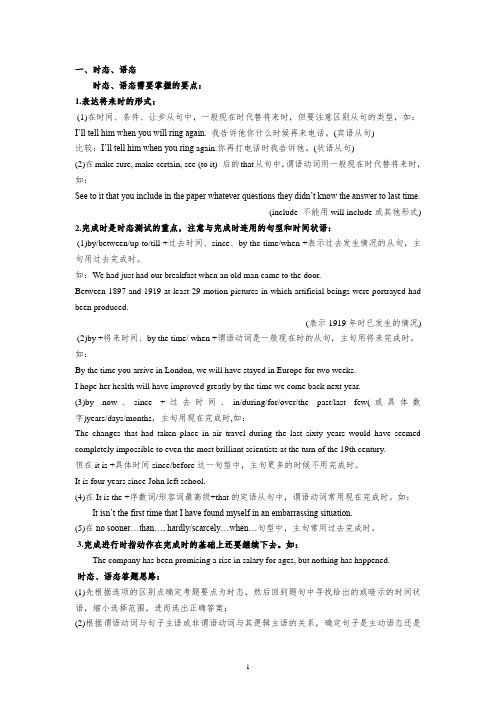
一、时态、语态时态、语态需要掌握的要点:1.表达将来时的形式:(1)在时间、条件、让步从句中,一般现在时代替将来时,但要注意区别从句的类型,如:I’ll tell him when you will ring again. 我告诉他你什么时候再来电话。
(宾语从句)比较:I’ll tell him when you ring again.你再打电话时我告诉他。
(状语从句)(2)在make sure, make certain, see (to it) 后的that从句中,谓语动词用一般现在时代替将来时,如:See to it that you include in the paper whatever questions they didn’t know the answer to last time.(include 不能用will include或其他形式) 2.完成时是时态测试的重点,注意与完成时连用的句型和时间状语:(1)by/between/up to/till +过去时间、since、by the time/when +表示过去发生情况的从句,主句用过去完成时。
如:We had just had our breakfast when an old man came to the door.Between 1897 and 1919 at least 29 motion pictures in which artificial beings were portrayed had been produced.(表示1919年时已发生的情况) (2)by +将来时间、by the time/ when +谓语动词是一般现在时的从句,主句用将来完成时。
如:By the time you arrive in London, we will have stayed in Europe for two weeks.I hope her health will have improved greatly by the time we come back next year.(3)by now、since +过去时间、in/during/for/over/the past/last few(或具体数字)years/days/months,主句用现在完成时,如:The changes that had taken place in air travel during the last sixty years would have seemed completely impossible to even the most brilliant scientists at the turn of the 19th century.但在it is +具体时间since/before这一句型中,主句更多的时候不用完成时。
高三英语一轮复习语法专题学案5:动词的时态和语态
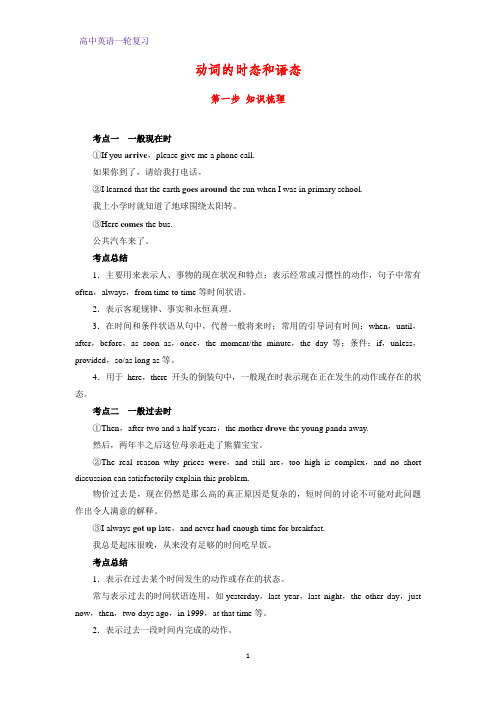
动词的时态和语态第一步知识梳理考点一一般现在时①If you arrive,please give me a phone call.如果你到了,请给我打电话。
②I learned that the earth goes around the sun when I was in primary school.我上小学时就知道了地球围绕太阳转。
③Here comes the bus.公共汽车来了。
考点总结1.主要用来表示人、事物的现在状况和特点;表示经常或习惯性的动作,句子中常有often,always,from time to time等时间状语。
2.表示客观规律、事实和永恒真理。
3.在时间和条件状语从句中,代替一般将来时;常用的引导词有时间:when,until,after,before,as soon as,once,the moment/the minute,the day等;条件:if,unless,provided,so/as long as等。
4.用于here,there开头的倒装句中,一般现在时表示现在正在发生的动作或存在的状态。
考点二一般过去时①Then,after two and a half years,the mother drove the young panda away.然后,两年半之后这位母亲赶走了熊猫宝宝。
②The real reason why prices were,and still are,too high is complex,and no short discussion can satisfactorily explain this problem.物价过去是,现在仍然是那么高的真正原因是复杂的,短时间的讨论不可能对此问题作出令人满意的解释。
③I always got up late,and never had enough time for breakfast.我总是起床很晚,从来没有足够的时间吃早饭。
高考英语一轮复习 动词的时态和语态精讲精练学案 新人教版
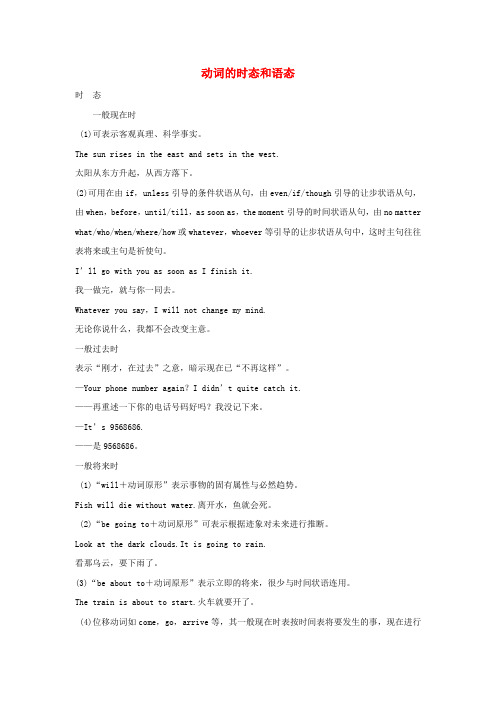
动词的时态和语态时态一般现在时(1)可表示客观真理、科学事实。
The sun rises in the east and sets in the west.太阳从东方升起,从西方落下。
(2)可用在由if,unless引导的条件状语从句,由even/if/though引导的让步状语从句,由when,before,until/till,as soon as,the moment引导的时间状语从句,由no matter what/who/when/where/how或whatever,whoever等引导的让步状语从句中,这时主句往往表将来或主句是祈使句。
I’ll go with you as soon as I finish it.我一做完,就与你一同去。
Whatever you say,I will not change my mind.无论你说什么,我都不会改变主意。
一般过去时表示“刚才,在过去”之意,暗示现在已“不再这样”。
—Your phone number again?I didn’t quite catch it.——再重述一下你的电话号码好吗?我没记下来。
—It’s 9568686.——是9568686。
一般将来时(1)“will+动词原形”表示事物的固有属性与必然趋势。
Fish will die without water.离开水,鱼就会死。
(2)“be going to+动词原形”可表示根据迹象对未来进行推断。
Look at the dark clouds.It is going to rain.看那乌云,要下雨了。
(3)“be about to+动词原形”表示立即的将来,很少与时间状语连用。
The train is about to start.火车就要开了。
(4)位移动词如come,go,arrive等,其一般现在时表按时间表将要发生的事,现在进行时可表计划、安排要做的事。
I arrive in Beijing at 3∶00 p.m.tomorrow.明天下午三点我会到达北京。
高考英语一轮复习 第3编语法突破 第5讲 动词的时态和语态课件

be about to do 即将,正要做(不与时间状语连 用,意同be on the point of doing)
Look!The race is about to start.
第十二页,共25页。
时态
用法
典句示例
表示从过去的某时间看
来将要发生的动作或存
过去 在的状态。由“should They were sure that they
end of,before 2000,
by the time+句子等
第十五页,共25页。
时 态
用法
典句示例
3.表示过去本打算实现而未实现的希望或 计划,常用动词有hope,want,expect, think,mean,suppose,plan,intend等
I had hoped to see more of Shanghai.(但未能如愿) I had meant to help you,but I was
第八页,共25页。
1.一般过去时主要表示过去某时发生 的动作或存在的状态,常和a moment ago;half an hour ago;just now;yesterday;last week;in 2005;in those days;at that time等表 示过去的时间状语连用。
He saw Mr.Wang yesterday. 昨天他看见王先生了。
第十一页,共25页。
时态
用法
典句示例
be to do...
1.(按计划、安排)打算;将要做
2.(按命令、指示、约定、要求、
职责、义务等)必须、必要、应该
一般 将来
时
做,相当于should,ought to, must,have to 3.表示注定会发生…… 4.(用于条件句)想;想要做……
高考英语一轮复习语法点专题讲解时态和语态
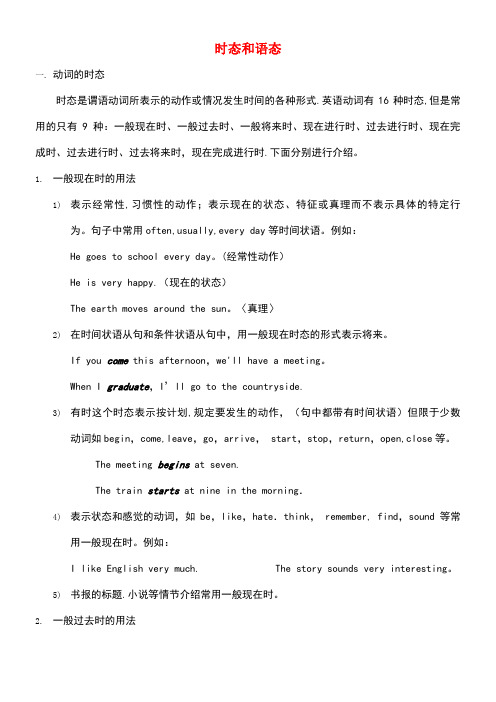
时态和语态一. 动词的时态时态是谓语动词所表示的动作或情况发生时间的各种形式.英语动词有16种时态,但是常用的只有9种:一般现在时、一般过去时、一般将来时、现在进行时、过去进行时、现在完成时、过去进行时、过去将来时,现在完成进行时.下面分别进行介绍。
1.一般现在时的用法1)表示经常性,习惯性的动作;表示现在的状态、特征或真理而不表示具体的特定行为。
句子中常用often,usually,every day等时间状语。
例如:He goes to school every day。
(经常性动作)He is very happy.(现在的状态)The earth moves around the sun。
〈真理〉2)在时间状语从句和条件状语从句中,用一般现在时态的形式表示将来。
If you come this afternoon,we'll have a meeting。
When I graduate,I’ll go to the countryside.3)有时这个时态表示按计划,规定要发生的动作,(句中都带有时间状语)但限于少数动词如begin,come,leave,go,arrive, start,stop,return,open,close等。
The meeting begins at seven.The train starts at nine in the morning.4)表示状态和感觉的动词,如be,like,hate.think, remember, find,sound等常用一般现在时。
例如:I like English very much. The story sounds very interesting。
5)书报的标题.小说等情节介绍常用一般现在时。
2.一般过去时的用法1)表示过去某时间发生的事、存在的状态或过去反复发生的动作。
He saw Mr。
Wang yesterday. He worked in a factory in 1988.2)表示过去经常发生的动作,也可用“used to”和“would+动词原形”.例如:I used to smoke. During the vacation I would swim in the sea.注意:used to表示过去常发生而现在不再发生的动作或存在的状态。
2022届高考英语一轮总复习专题五动词的时态和语态学案含解析新人教版

专题五动词的时态和语态考点精讲一动词的时态考点一一般现在时1.表示经常性、,usually,every day 等时间状语。
Works of popular writers often have a lot of readers.流行作家的作品往往拥有很多读者。
His father is a worker and doesn't smoke.他父亲是一名工人,不吸烟。
2.表示客观事实、普遍真理或自然现象,无论在什么情况下都用一般现在时表示。
We learnt that the earth moves around the sun.我们了解了地球绕着太阳转。
3.如果主句是一般将来时,那么在由when,while,before, after,until,as soon as 等引导的时间状语从句、if和unless引导的条件状语从句中,可用一般现在时代替一般将来时,表示将来的动作或状态。
The sentence will be easy to understand when you divide it into three parts.当你把这个句子分成三部分时,很容易理解。
4.表示按计划、时刻表规定要发生的动作,但限于少数动词。
如begin,e,leave,go,arrive,start,stop,return,open,close 等。
The flight takes off at 2∶30 every Wednesday and Friday.每周三和周五航班两点三十分起飞。
考点二一般过去时1(或上下文语境有暗示)。
At that time,he worked as a teacher to support the family.那段时间他靠教书养家。
2.用于表示过去经常发生的或习惯性的动作。
Michael's father always helped the poor as he believed it made everyone happier.迈克尔的父亲总是帮助穷人,因为他觉得这样让大家都更开心。
高三英语一轮复习学案:语法部分第5讲动词时态和语态
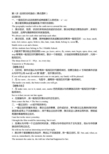
第5讲动词时态和语态(要点透析)动词时态一、一般现在时(动词用原形或单数第三人称后加-s/-es)1.表示客观事实或普遍真理(不受时态限制)The geography teacher told us the earth moves around the sun.2.表示现状、性质、状态时多用系动词或状态动词;表示经常或习惯性的动作,多用行为动词,且常与表频率的时间状语连用。
We always care for each other and help each other.3.表示知觉、态度、感情、某种抽象的关系或概念的词常用一般现在时:see, hear, smell, taste, feel, notice, agree, believe, like, hate, want, think, belong to, seem等。
Smith owns a car and a house.All the students here belong to No.1 Middle School.4.少数用于表示起止的动词如come, go, leave, arrive, fly, return, start, begin, open, close, end, stop等常用一般现在时代替将来时。
表示一个按规定、计划或安排要发生的动作,只用一般现在时。
The shop closes at 11:00 p.m. every day.Tomorrow is Wednesday.【疑难点击】1.在时间、条件状语从句中常用一般现在时代替将来时。
但要注意由if 引导的条件状语从句中可以用shall或will表“意愿”,但不表示时态。
If you will accept my invitation and come to our party, my family will be pleased.2.在the more…the more… 句型中,通常用一般现在时代替一般将来时。
高三英语复习教学案语法时态和语态
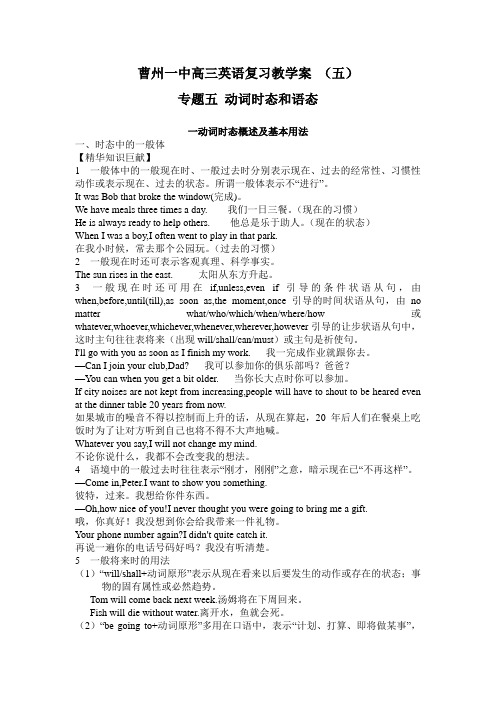
曹州一中高三英语复习教学案(五)专题五动词时态和语态一动词时态概述及基本用法一、时态中的一般体【精华知识巨献】1一般体中的一般现在时、一般过去时分别表示现在、过去的经常性、习惯性动作或表示现在、过去的状态。
所谓一般体表示不“进行”。
It was Bob that broke the window(完成)。
We have meals three times a day. 我们一日三餐。
(现在的习惯)He is always ready to help others. 他总是乐于助人。
(现在的状态)When I was a boy,I often went to play in that park.在我小时候,常去那个公园玩。
(过去的习惯)2一般现在时还可表示客观真理、科学事实。
The sun rises in the east. 太阳从东方升起。
3一般现在时还可用在if,unless,even if引导的条件状语从句,由when,before,until(till),as soon as,the moment,once引导的时间状语从句,由no matter what/who/which/when/where/how或whatever,whoever,whichever,whenever,wherever,however引导的让步状语从句中,这时主句往往表将来(出现will/shall/can/must)或主句是祈使句。
I'll go with you as soon as I finish my work. 我一完成作业就跟你去。
—Can I join your club,Dad? 我可以参加你的俱乐部吗?爸爸?—You can when you get a bit older. 当你长大点时你可以参加。
If city noises are not kept from increasing,people will have to shout to be heared even at the dinner table 20 years from now.如果城市的噪音不得以控制而上升的话,从现在算起,20年后人们在餐桌上吃饭时为了让对方听到自己也将不得不大声地喊。
高考英语一轮复习《动词的时态与语态》教案 新人教版
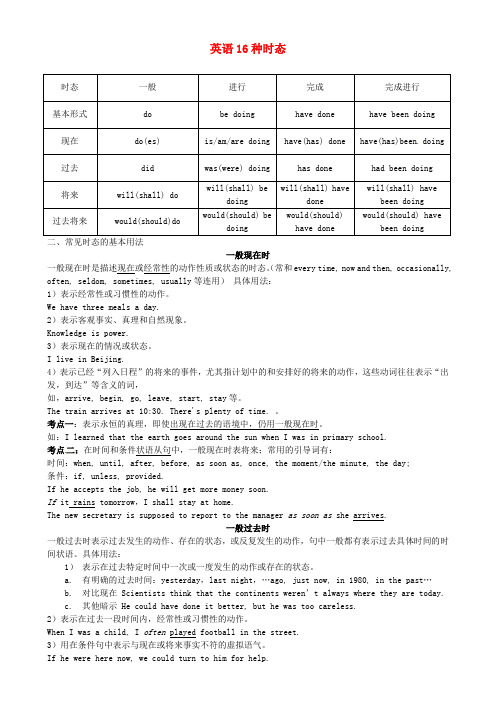
英语16种时态二、常见时态的基本用法一般现在时 一般现在时是描述现在或经常性的动作性质或状态的时态。
(常和every time, now and then, occasionally, often, seldom, sometimes, usually 等连用) 具体用法:1)表示经常性或习惯性的动作。
We have three meals a day.2)表示客观事实、真理和自然现象。
Knowledge is power.3)表示现在的情况或状态。
I live in Beijing.4)表示已经“列入日程”的将来的事件,尤其指计划中的和安排好的将来的动作,这些动词往往表示“出发,到达”等含义的词,如,arrive, begin, go, leave, start, stay 等。
The train arrives at 10:30. There's plenty of time. 。
考点一:表示永恒的真理,即使出现在过去的语境中,仍用一般现在时。
如:I learned that the earth goes around the sun when I was in primary school.考点二:在时间和条件状语从句中,一般现在时表将来;常用的引导词有:时间:when, until, after, before, as soon as, once, the moment/the minute, the day;条件:if, unless, provided.If he accepts the job, he will get more money soon.If it rains tomorrow ,I shall stay at home.The new secretary is supposed to report to the manager as soon as she arrives.一般过去时一般过去时表示过去发生的动作、存在的状态,或反复发生的动作,句中一般都有表示过去具体时间的时间状语。
- 1、下载文档前请自行甄别文档内容的完整性,平台不提供额外的编辑、内容补充、找答案等附加服务。
- 2、"仅部分预览"的文档,不可在线预览部分如存在完整性等问题,可反馈申请退款(可完整预览的文档不适用该条件!)。
- 3、如文档侵犯您的权益,请联系客服反馈,我们会尽快为您处理(人工客服工作时间:9:00-18:30)。
第5讲动词时态和语态(要点透析)动词时态一、一般现在时(动词用原形或单数第三人称后加-s/-es)1.表示客观事实或普遍真理(不受时态限制)The geography teacher told us the earth moves around the sun.2.表示现状、性质、状态时多用系动词或状态动词;表示经常或习惯性的动作,多用行为动词,且常与表频率的时间状语连用。
We always care for each other and help each other.3.表示知觉、态度、感情、某种抽象的关系或概念的词常用一般现在时:see, hear, smell, taste, feel, notice, agree, believe, like, hate, want, think, belong to, seem等。
Smith owns a car and a house.All the students here belong to No.1 Middle School.4.少数用于表示起止的动词如come, go, leave, arrive, fly, return, start, begin, open, close, end, stop等常用一般现在时代替将来时。
表示一个按规定、计划或安排要发生的动作,只用一般现在时。
The shop closes at 11:00 p.m. every day.Tomorrow is Wednesday.【疑难点击】1.在时间、条件状语从句中常用一般现在时代替将来时。
但要注意由if 引导的条件状语从句中可以用shall或will表“意愿”,但不表示时态。
If you will accept my invitation and come to our party, my family will be pleased.2.在the more…the more… 句型中,通常用一般现在时代替一般将来时。
The harder you study, the better results you will get.【疑难点击】3.在make sure, see to it, mind, care, matter后的宾语从句的谓语动词用一般现在时代替一般将来时。
See to it that you are not late again.4.在倒装句中,用一般现在时表示动作正在进行。
Here comes the bus.=The bus is coming.二、一般过去时(-ed或不规则变化)1.一般过去时的基本用法:表示过去的事情、动作或状态,常与表示过去具体的时间状语连用(或有上下文语境暗示);用于表达过去的习惯;表示说话人原来没有料到、想到或希望的事通常用过去时。
I met her in the street yesterday.I thought the film would be interesting, but it isn't.2.如果从句中有一个过去的时间状语,尽管从句中的动作先于主句发生,但从句中的谓语动词仍用过去式。
He told me he read an interesting novel last night.3.表示两个紧接着发生的动作,常由以下词语连接,用一般过去时。
如:but, and, when, as soon as, immediately, the moment, the minute.The moment she came in, she told me what had happened to her.三、一般将来时1.表示未来的动作或状态常用will / shall +动词(常与表示将来的时间状语连用如:tomorrow,next week等)。
2.表示一种趋向或习惯动作。
We'll die without air or water.3.表示趋向行为的动词,如:come,go,start,begin,leave等词,常用进行时的形式表示将来时。
【疑难点击】be going to与will / shall, be to do, be about to do的用法及区别:1.shall / will do表示未事先考虑过,即说话时临时做出的决定。
— You've left the light on.— Oh, so I have. I'll go and turn it off.2.在祈使句+and/or+陈述句句型中,陈述句中只能用will/情态动词+动词原形。
Work hard, and you will pass the exam.【疑难点击】3.be going to表示现在打算最近或将来要做某事,这种打算往往经过事先考虑,甚至已做了某种准备;表将来,不能用在条件状语从句的主句中;而will则能,表意愿。
If it is fine, we'll go fishing. (√)If it is fine, we are going to go fishing. (×)【疑难点击】4.be to do sth. 表按计划、安排即将发生的动作,还可表示吩咐、命令、禁止、可能性等。
A meeting is to be held at 3:00 this afternoon.5.be about to do sth. 表示“即将,就要”,后面不能接时间状语或状语从句。
Autumn harvest is about to start.四、现在进行时(am/is/are+v.-ing)表示说话时正在发生着的一个动作;表示现阶段但不一定是发生在讲话时;表近期特定的安排或计划;go,come等起止动作可用进行时代替将来时。
It is raining now.He is teaching English and learning Chinese.The girl is always talking loud in public. (与always, often等频度副词连用,表经常反复的行动或某种感情色彩)【疑难点击】下面四类动词不宜用现在进行时:a.表示心理状态、情感的动作:like, love, hate, care, remember, believe, want, mind, wish, agree, mean, need。
b.表存在的状态的动词:appear, exist, lie, remain, seem, belong to, depend on。
c.表示瞬时性动作的动词:allow, accept, permit, promise, admit, complete。
d.表示感官的动词:see, hear, notice, feel, smell, sound, taste, look。
五、过去完成时(had+v.-ed)常用过去完成时的几种情况:1.在by, by the end, by the time, until, before, since后接表示过去某一时间的短语或从句,其谓语动词则表示在某一时刻或某一动作之前已经完成了的动作,即“过去的过去”。
By the end of last year, we had produced 20,000 cars.2.表示从过去某一时刻开始一直延续到另一过去时刻的动作或状态,即“从过去到过去”。
When Jack arrived, Mary had been away for almost an hour.3.表示未曾实现的希望、打算、意图、诺言等。
常用had hoped / planned / meant / intended/ thought / wanted / expected等或用上述动词过去式接不定式完成式表示,即:hoped / pl anned…+to have done。
I had hoped to send him a Christmas card, but I forgot to do so.【疑难点击】1.表示“一……就……”的几个句型:Hardly/scarcely…when (before)…no sooner…than…We had no sooner been seated than the bus started. =No sooner had we been seated than the bus started.2.在before或after引导的时间状语从句中用一般过去时态代替过去完成时。
After he (had) left the room, the boss came in.We arrived home before it snowed.【疑难点击】3.It/That/This was the first(second,third…)time that…(从句中用过去完成时态)It was the second time that he had been out with her.4.…than sb. had thought / expected / hoped / wanted…We arrived earlier than we had expected.六、过去将来时(would do, was / were going to do)过去将来时表示从过去某个时间看将要发生的事情。
I said I would arrange everything.【疑难点击】1.come, go, leave等用过去进行时表过去将来时。
He was leaving for Beijing.2.was / were to do sth. 和was / were about to do sth. 表过去将来,was/were to do sth.常与when搭配。
I was about to leave when the telephone rang.七、过去进行时(was/were +v.-ing)1.过去某一时刻正在进行的动作或某一阶段内发生或频繁发生的动作。
During the summer of 2010 she was traveling in Europe.2.表示某一动作发生时另一动作正在发生,其中一个在由when或while引导的时间状语从句中。
I met Diana while I was shopping this morning.3.过去进行时可以表示委婉语气。
I was wondering if you could give me a lift.八、现在完成时(has/have+v.-ed)1.表示到现在为止已发生或完成的动作,强调结果的影响。
